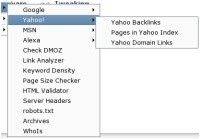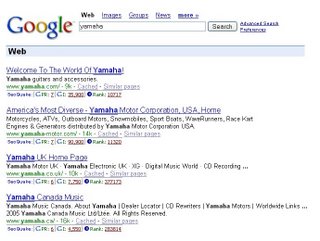Deep linking is as important a consideration as back linking! It does not matter which page visitors use to enter our websites. If they like what they read on our internal pages, they are more likely to view other pages on our websites. If they view other pages on our website, they are likely to find our homepage, and we will get a chance to tell them why they should buy our products or services.
Deep links to our website help to ensure that the search engines will have good cause to show our internal webpages as well as our homepage. For every page in our website that gets great SERP, our chances of getting a sale are increased significantly.
We have 15 pages on our website, eight of which provide real content to our prospective clients. All eight of these pages have a significant number of back links pointing to them. 48% of our visitors land on our home page. 37% of our visitors land on our internal pages. As a result, 85% of our traffíc lands on our website as a result of our back links, either directly or through our natural search placement in the search engines. The remaining 15% arrive on our website through bookmarks, personal referrals, and paid listings.
What Are Deep Links?Deep links are links that go to specific pages within your website. For example, let's say that you have a home improvement website that has a large number of pages and articles on it telling people how to do projects. If all of your back links are pointing only to your home page and you have none pointing to specific article pages, then you are not getting the full benefit of your linking activities.
Think about it this way, if I go to your website and find a piece of information that I find particularly helpful or interesting and I want to tell other people about it, how will I do it? When I tell all my friends on my blog about this great page of yours, am I going to link to your home page? No, I am going to copy and paste the actual webpage address out of my browser, into my blog. That is deep linking and what is considered to be natural linking by the search engines.
What Are Natural Links? Natural links are those links that are created by people other than the website's marketing team. Suppose I posted a link in my own blog that said that the "most easily understood tutorial, I have read, for creating a php-xml parser" was: http://www.sitepoint.com
Difficulties In Creating Deep Links
There are a few problems that you will run into when trying to create deep links to your site. One problem is that if you ask a Webmaster of another site to link to you, they will most likely just link to your home page. When you submit to directories, the vast majority of them will only allow you a link to your home page, not a deep link. Even if they do allow you to submit a deep link, they will not allow you to submit 10 deep links.
Success Tips For Creating Deep LinksDeep linking is quite a bit easier when utilizing free reprint articles as a part of your link building campaign. This is because you can put whatever link you want to put in the "About The Author" box. The About The Author box is required to stay intact in all websites that are using your article. If you intend on writing a large number of articles to promote your domain, then you will want to optimize your results by putting a different deep link into the About The Author box for each of the articles that you write.
Another method of doing this is free and easy, but requires a bit of time. Take keywords in each page of the text on your website and make a hyperlink on that word or phrase to another page on your site. This is very easily done if you know how to do basic HTML. The ultimate goal here is to have every page of your website linked to, at least once, by another page on your site. You will want to spread these out among your domain's webpages, instead of having just a couple of pages linking to the other 50 pages.









